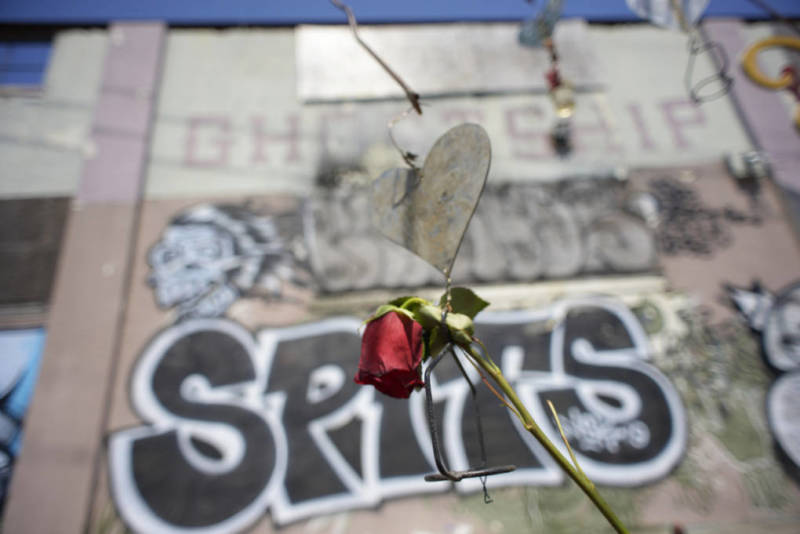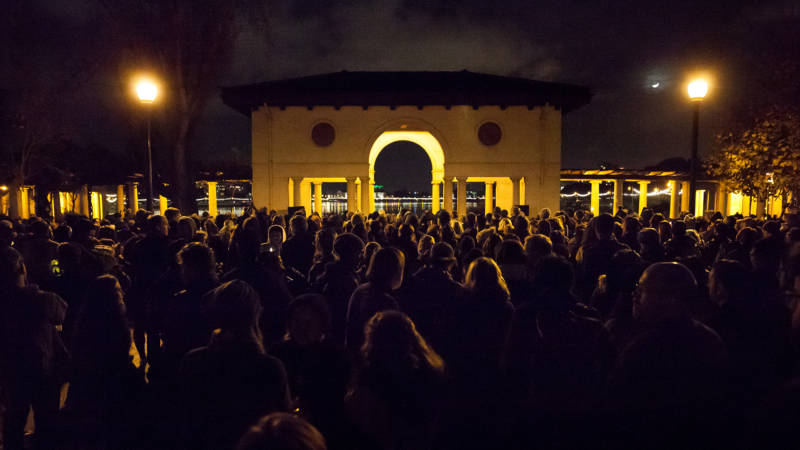Jurors delivered a mixed decision in the Ghost Ship criminal trial Thursday, acquitting Max Harris of all charges but failing to reach a unanimous verdict for Derick Almena, who now faces the possibility of a retrial. The defendants each faced 36 counts of involuntary manslaughter for their managerial roles at the un-permitted East Oakland warehouse venue and residence where 36 people died during an electronic music event on Dec. 2, 2016.
For Oakland's Wounded Music Scene, No Ghost Ship Verdict Could Deliver Justice

Family members of the deceased have been outspoken, regularly addressing media at the courthouse about their desire to see the defendants found guilty. But local music community figures interviewed by KQED, including people who survived the fire and who each lost at least several friends, expressed a nuanced view of the verdict, saying no outcome of Harris and Almena’s prosecution could resemble justice or elicit any semblance of satisfaction.
“The trial is the wrong place to look if you want to see things get better, if you want real justice for the people we lost,” said Nihar Bhatt, a San Francisco DJ and record label proprietor who escaped the fire and has since released or prepared posthumous titles by some of his friends who did not, including the local artists Johnny Igaz (Nackt) and Joey Casio (Obsidian Blade).
Bhatt and other underground music figures said Ghost Ship was widely considered an unsafe venue, but shows occurred there due to a dwindling number of alternative art spaces in Oakland—a trend that’s only intensified in recent years. He pointed to Safer DIY Spaces, which formed after the fire to assist underground arts spaces with code-compliance and advocate for them at Oakland City Hall, as an example of a better way to honor the lives of people lost than putting anyone in prison.

David Keenan, director of Safer DIY Spaces, said the trial has partly worked as a diversion, distracting the public from holding the City of Oakland accountable for the gulf between its promises and actions as far as compassionate code-enforcement after the fire. Officials vowed to help tenants of other un-permitted warehouses make safety improvements without risking displacement. “Instead they’ve made it harder to legalize these places,” Keenan said.
Bhatt expressed similar frustration because recommendations from a city task force formed after the fire to address barriers to compliance with special events regulations have largely fallen to the wayside without meaningful adoption. “It’s easier in our current culture to focus on the conviction of individuals,” Bhatt said. “We should be looking at the laws and the economic situation in the Bay Area and the way those things converged [with the Ghost Ship fire].”
Many local arts figures are sympathetic to defense attorneys’ argument that Harris and Almena are scapegoats, believing city officials and the building owners should share some of the blame. (Landlord Chor Ng is among the defendants in families’ pending civil lawsuit.) They’re also generally in agreement with Harris’ co-counsel Tyler Smith that the rising cost of living contributed to the tragedy.
“None of this would’ve happened in the first place if the income inequality and the housing crisis weren’t as bad, wasn’t permitted to get as bad as it’s gotten in the Bay Area and in Oakland,” Smith said at the courthouse Thursday.
Still, arts and music figures affected by the fire aren’t necessarily fond of the defendants themselves. “They were total douchebags,” said Sharmi Basu, an Oakland experimental musician who played a prominent role in fundraising for fire relief. But as a self-described prison abolitionist, Basu continued, she derived no pleasure from the prospect of their incarceration. “The justice system isn’t going to provide the systemic reform we need,” she said.
Other aspects of the defense dismayed music figures who followed the case. The defense implied during the trial that an unsavory, sinister element resided in the neighborhood, conjuring images of gangs and sex workers in an effort to lend credence to its assertion that the fire was set intentionally and to cast the warehouse as a comparatively rosy and idealistic arts collective.
In a way, said Bhatt and others, that defense strategy made the largely Latino, working-class Fruitvale district of East Oakland the trial’s forgotten victim. The assertion that a band of Latino arsonists in hoodies lit the warehouse on fire strained credulity to people who were there, and seemed to rely on racist tropes to burnish the image of Ghost Ship and its operators. “It was thinly veiled racism and also paranoia,” Bhatt said.
Jonathan Axtell, who recalled his harrowing escape from the fire as a prosecution witness in June, said the people he knew who died at Ghost Ship would be disappointed to see their names and memories used in the pursuit of lengthy prison sentences instead of pushing back against inequality and displacement in the Bay Area. “What’s been top of my mind is not whether or not they convict Derick and Max, but whether we live for what they lived for,” he said.
A hearing regarding Almena’s possible retrial is scheduled for Oct. 4. A separate civil case brought by family members against the City of Oakland, Pacific Gas & Electric and the Ngs, among others, is scheduled to begin trial in May, lead attorney Mary Alexander said Thursday. The statute of limitations prevents the Ngs from facing criminal charges stemming from the Ghost Ship fire after Dec. 3, 2019.
KQED reporter Don Clyde contributed to this post.

